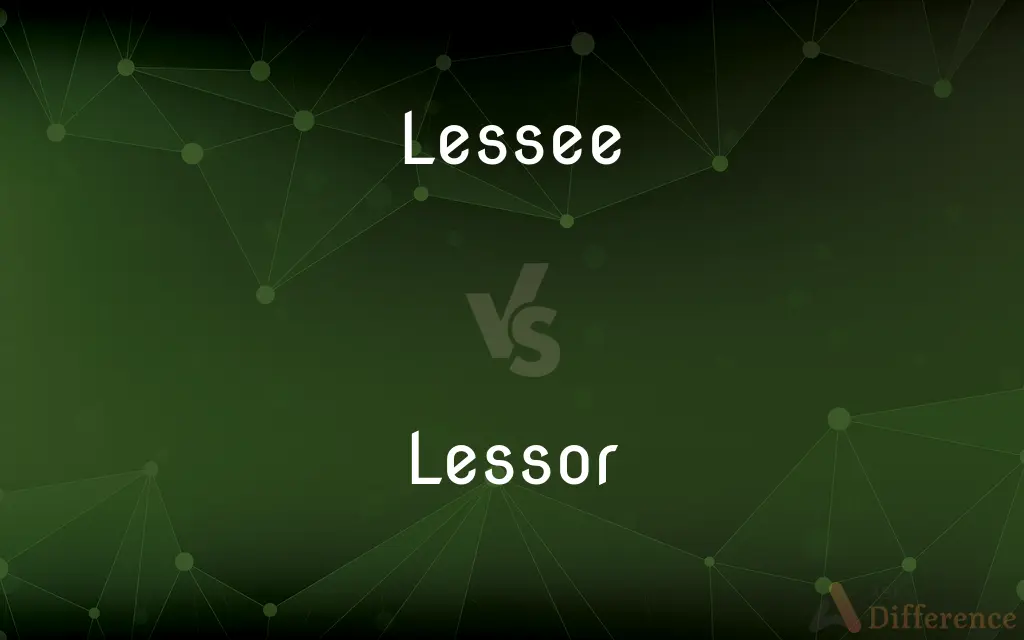Lessee vs. Lessor — What's the Difference?
By Tayyaba Rehman — Updated on October 26, 2023
Lessee is the individual renting the property, while the Lessor is the property owner leasing it out.

Difference Between Lessee and Lessor
Table of Contents
ADVERTISEMENT
Key Differences
The lessee is the individual or entity that obtains the rights to use and occupy property through a lease agreement. Conversely, the lessor is the property owner who grants these rights.
In a lease agreement, the lessee typically pays rent to the lessor in exchange for the right to use the property. The lessor, meanwhile, receives this rent while retaining ownership of the property.
Responsibilities of the lessee include maintaining the property's condition and adhering to the lease terms. The lessor is responsible for ensuring the property is habitable and for addressing major repairs.
The lessee's tenure on the property is temporary and based on the lease's duration. For the lessor, leasing out property can be a long-term investment or income source.
At the lease's end, the lessee usually vacates the property unless the lease is renewed. The lessor can then choose to re-lease the property or use it for other purposes.
ADVERTISEMENT
Comparison Chart
Role
Rents or leases property
Owns and leases out property
Financial Flow
Pays rent
Receives rent
Responsibilities
Maintain property, adhere to lease terms
Ensure habitability, major repairs
Tenure
Temporary, based on lease
Long-term ownership
Lease End
Typically vacates or renews lease
Can re-lease or repurpose property
Compare with Definitions
Lessee
A renter
As a lessee, she was responsible for minor repairs.
Lessor
A landlord
The lessor collected rent from all tenants.
Lessee
A tenant
The lessee paid rent on the first of every month.
Lessor
A property owner
As a lessor, he owned several rental units.
Lessee
A leaseholder
The lessee renewed the lease for another year.
Lessor
A rent collector
The lessor raised the rent this year.
Lessee
A contractual occupant
The lessee received a notice for lease termination.
Lessor
A property manager
The lessor handled all major repairs promptly.
Lessee
A user of leased property
The lessee transformed the space into a studio.
Lessor
A lease provider
The lessor offered a flexible leasing term.
Lessee
A person who holds the lease of a property; a tenant
The brewery said that the lessees of its pubs have no obligation to buy its beer
Lessor
One who leases property; a landlord.
Lessee
One that holds a lease; a tenant.
Lessor
(property law) The owner of property that is leased; the landlord to a lease.
Lessee
An individual or a corporation who has the right of use of something of value, gained through a lease agreement with the real owner of the property.
Lessor
One who leases; the person who lets to farm, or gives a lease.
Lessee
The entity to whom a lease is given, or who takes an estate by lease.
Lessor
Someone who grants a lease
Lessee
Someone who is allowed to use a house, building, land etc. for a period of time in return for payment to the owner.
Lessee
Pronunciation spelling of let's see
Lessee
The person to whom a lease is given, or who takes an estate by lease.
Lessee
A tenant who holds a lease
Common Curiosities
Does a lessor have to provide notice before visiting the property?
Generally, yes. Notice requirements are often specified in the lease.
Is a lessor responsible for property taxes?
Yes, property taxes are typically the lessor's responsibility.
Can a lessee terminate a lease early?
It depends on the lease terms and potential penalties.
Can a lessee sublease the property?
Yes, if allowed by the lease terms and the lessor's consent.
Are lessees responsible for utilities?
This varies and should be outlined in the lease agreement.
Can a lessor increase rent during the lease term?
This depends on the lease terms and local rent control laws.
Can a lessee make permanent changes to the property?
Usually, this requires the lessor's permission.
Does a lessee need insurance for the leased property?
While not always required, it's often advisable for protection.
Can a lessee renew a lease automatically?
It depends on the lease terms and mutual agreement.
Can a lessee run a business on the leased property?
This depends on the lease terms and zoning laws.
Is a lessor liable for injuries on the property?
The lessor could be liable, especially for known hazards.
Can a lessor evict a lessee without cause?
This depends on local laws and the lease agreement.
Can a lessee withhold rent for repairs?
In some cases and jurisdictions, but usually with specific conditions.
Can a lessor enter the property for inspections?
Yes, but usually with notice and at reasonable times.
Does a lessor have to return a security deposit?
Typically, yes, unless there are damages or unpaid rent.
Share Your Discovery

Previous Comparison
Intercity vs. Intracity
Next Comparison
Adventurous vs. AdventureAuthor Spotlight
Written by
Tayyaba RehmanTayyaba Rehman is a distinguished writer, currently serving as a primary contributor to askdifference.com. As a researcher in semantics and etymology, Tayyaba's passion for the complexity of languages and their distinctions has found a perfect home on the platform. Tayyaba delves into the intricacies of language, distinguishing between commonly confused words and phrases, thereby providing clarity for readers worldwide.
















































